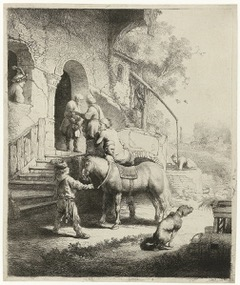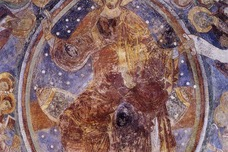Sunday Reflection with Canon Robin Gibbons: July 13th 2025

The Good Samaritan - Rembrandt Wiki Image
Fifteenth Sunday in Ordinary Time
Lectionary: 105
The one thing that I rejoice in, concerning our faith, is that it is not hidden, everything we need is obvious; this doesn't suit everybody, there are some who would prefer a religion with secrets and hidden meanings. The Gnostics in the early centuries of the Church were like that, they wanted to feel special, different from everybody else with specialised knowledge only understood by the initiated, but that has never been Christianity in its truest sense, for Jesus did not teach us secrets but opened up a relationship with himself and the Triune God and gave us the simplest of commandments, yet the most encompassing: to follow.
We have it laid before us in our Gospel this Sunday when Jesus answers the question set before him by the Scholar of the Law, but note, Jesus does not give the answer, he draws it out of the questioner who already knows the answer but needs to articulate his belief openly and transparently. This is our faith too, built on Christ who is truthful not dissembling, who is always enjoining on us openness not hidden esoteric teachings.
It pays us to pause ands take on board the simplicity of their dialogue and then reflect that this too has to be our answer: 'There was a scholar of the law* who stood up to test him and said, "Teacher, what must I do to inherit eternal life? "Jesus said to him, "What is written in the law? How do you read it? "He said in reply, "You shall love the Lord, your God, with all your heart, with all your being, with all your strength, and with all your mind, and your neighbour as yourself." He replied to him, "You have answered correctly; do this and you will live."(Lk 10: 25-28)
What can we take from this? Firstly it is a good thing to question faith in a constructive manner. Secondly, we know the source material for our answers; it is there in the teachings of Jesus in the Scriptures. Thirdly the answer is predicated on the great commandment, love of God then our neighbour-as us. And, Jesus reminds the scholar of the law that to do these things is also to live in God. Now this is all to the good, and perhaps we ought to articulate this more often because there are those who would confuse, confound and create problems. Let me explain.
There is a kind of 'speciality' religion creeping back in the social media, especially by commentators or pundits, who know little of Church history, let alone good theology or scripture, nor really understand the living tradition, that is faith handed down to be lived in each age. Love is immutable but how we exercise it varies. Hence the parable of the Good Samaritan, by which means Jesus uses as a device to disturb and stir up our consciences. The premise of the story lies in the position of both the robbed and injured man, our neighbour, and of the outcast Samaritan, an outsider to the faith.
As often happens Jesus is throwing the question of who is God's friend, child, relation back to us, and is challenging us to let go of prejudice and hatred. We do not know if the 'man' is supposed to be a Jew, or a foreigner, but it doesn't matter, as we shall see. In this story to one who loves as God asks is the one we would have put outside our community.
Jesus indicates this hypocrisy further by showing passers by, a priest and a Levite, religious and legal figures, people who should know better, by telling us simply not even noticing the victim. Does that stir up a few echoes in your minds too? We have ignored the hidden victims of human abuse and cruelty for too long, we cannot ignore the obvious. And so the parable shows us up, the generosity of the stranger Samaritan in practical and pastoral love is a mirror for us to look into. Yet it is more, for hidden, yet known in the person of the Samaritan is the Saviour himself. It is through us and others, as the living icons of the Lord, that he binds up our wounds, tends to our pain, and is with us always where we come together in his name. And, it is he, the real and true Good Samaritan who will come back again for us.
Perhaps we need to be simpler in the way we live out faith, but also be more compassionately challenging towards those people who make faith more complex and complicated than it should be. Maybe Moses can help us here, after all he met God and lived, but then as part of his ministry, handed on to the people something easily understood. I shall let the scripture speak for itself, but with you rejoice that our faith, as Jesus taught, is not the preserve of the clever and learned, but to those who become like little children, humble an contrite of heart! In truth the command of that love of Christ is always very near to us, may we have the gift to be both a good neighbour towards others, but in ourselves, become open always as a neigbour for others for we too need their compassion. Let us pray that each of us be given the gift and grace of the Spirit, to carry out the commandments of mercy and love!
'Moses said to the people:
"If only you would heed the voice of the LORD, your God,
and keep his commandments and statutes
that are written in this book of the law,
when you return to the LORD, your God,
with all your heart and all your soul.
…No, it is something very near to you,
already in your mouths and in your hearts;
you have only to carry it out."' (Deut 20: 10, 14)
Lectio
Pope Francis, Midday Angelus reflection of the Gospel of the Good Samaritan
July 10th 2016
Jesus uses this parable in the dialogue with a doctor of the Law, with regard to the double commandment that allows one to enter into eternal life: to love God with all one's heart, and to love one's neighbour like oneself. "Yes", replies the doctor of the Law, "And who is my neighbour?" "We too might ask ourselves this question", said the Holy Father. "Who is my neighbour? Who must I love like myself? My relatives? My friends? My compatriots? Those who share the same religion? Who is my neighbour?"
Christ's answer is the parable of the good Samaritan, that of a man who on the road from Jerusalem to Jericho is assailed by brigands, assaulted and abandoned. First a priest passes along the same road, then a Levite; neither of them, seeing the injured man, stop but instead carry on their way without helping. Then there passes a Samaritan, a man from the region of Samaria whose inhabitants were ill-regarded by the Jews as they did not observe the true religion. The Samaritan is moved by the plight of the injured man, and stops to dress his wounds. He takes him to an inn and the following day pays the innkeeper for the room where he is to stay until he recovers. At this point, Jesus asks the doctor of the Law, "Which of these three, do you think, proved to be a neighbour to the man who fell among the robbers?" The doctor of the law answers, "The one who showed him mercy."
"In this way Jesus completely changes the initial perspective of the doctor of the Law", explained Francis. "I must not categorise others to decide who is my neighbour and who isn't. It is for me to decide to be or not to be a neighbour … to the person I encounter and who is in need of help, even if he or she is a stranger or even hostile. Jesus concludes, 'You go, and do likewise', … and he repeats it to each one of us. Be a neighbour to the brother or sister we see in difficulty. … Do good works, do not merely say good words that are then dispersed in the wind. … And through good works, that we do for our neighbour with love and good cheer, our faith germinates and bears fruit. Let us ask ourselves, is our faith fruitful? Does our faith produce good works? Or is it barren, and therefore more dead than alive? Am I a neighbour, or do I simply walk on by? Am I one of those who choose people according to my taste?"
"It is good to ask ourselves these questions and to do so frequently, because in the end we will be judged for our works of mercy", underlined the Holy Father. "The Lord will be able to say to us, 'Do you remember that time on the road from Jerusalem to Jericho? I was that man, half dead by the roadside. Do you remember? I was that hungry child. Do you remember? I was that migrant whom so many wanted to send away. I was those lonely grandparents, abandoned in a rest home. I was that sick person, alone in hospital, whom no-one came to visit."


















